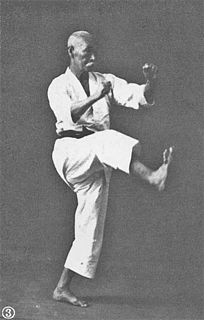
Karate (空手) is a martial art developed in the Ryukyu Kingdom. It developed from the indigenous Ryukyuan martial arts under the influence of Chinese martial arts, particularly Fujian White Crane. Karate is now predominantly a striking art using punching, kicking, knee strikes, elbow strikes and open-hand techniques such as knife-hands, spear-hands and palm-heel strikes. Historically, and in some modern styles, grappling, throws, joint locks, restraints and vital-point strikes are also taught. A karate practitioner is called a karateka (空手家).

Gōjū-ryū (剛柔流), Japanese for "hard-soft style", is one of the main traditional Okinawan styles of karate, featuring a combination of hard and soft techniques. Both principles, hard and soft, come from the famous martial arts book used by Okinawan masters during the 19th and 20th centuries, the Bubishi. Gō, which means hard, refers to closed hand techniques or straight linear attacks; jū, which means soft, refers to open hand techniques and circular movements. Gōjū-ryū incorporates both circular and linear movements into its curriculum, combining hard striking attacks such as kicks and close hand punches with softer open hand circular techniques for attacking, blocking, and controlling the opponent, including joint locks, grappling, takedowns, and throws.

Noriyuki "Pat" Morita was an American actor and comedian. He was known for his roles as Matsuo "Arnold" Takahashi on Happy Days, Mr. Miyagi in The Karate Kid film series, Captain Sam Pak on the sitcom M*A*S*H, Ah Chew in Sanford and Son, Mike Woo in The Mystery Files of Shelby Woo, and The Emperor of China in Mulan and Mulan II. He was the series lead actor in the television program Mr. T and Tina and in Ohara, a police-themed drama. The two shows made history for being among the few TV shows with an Asian-American series lead.
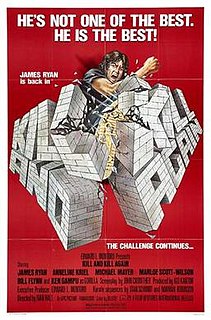
Kill and Kill Again is a 1981 action film directed by Ivan Hall. The film stars James Ryan as Steve Chase who is hired to save the scientist Horatio Kane, who has been kidnapped by the scientist Marduk. Chase gathers together a team of mercenaries who find their way to the villain's stronghold and then find themselves fighting for their lives as they are captured.

The Next Karate Kid is a 1994 American martial arts drama film, and the fourth installment in The Karate Kid franchise, following The Karate Kid Part III (1989). It stars Hilary Swank as Julie Pierce and Pat Morita as Mr. Miyagi.
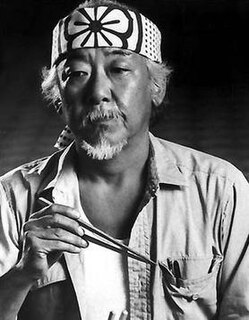
Mr. Miyagi is a fictional character in the original films (1984-1994) of the Karate Kid franchise. He is a karate master who mentors Daniel LaRusso and Julie Pierce. Although he died in 2011, Miyagi is frequently referenced in the series Cobra Kai, which is itself thematically structured via The Miyagi-Verse.

Chōjun Miyagi was an Okinawan martial artist who founded the Gōjū-ryū school of karate by blending Okinawan and Chinese influences.
The elderly martial arts master is a mentor/teacher stock character in fiction, especially Wuxia, Chanbara, and other martial arts films. Typically an East Asian male, he is a near-invincible master of the martial arts, despite being advanced in age and presumably having a decrease in physical strength. Often he possesses the rank of sensei and is referred to as such by his student. The elderly master most often teaches either generic kung fu or an exotic style specific to the fictional period. During the films, the master often becomes close with their student, with the master becoming a guardian figure to the trainee, who is, in turn, looked upon as the master's child. Usually, when the master is captured or killed, or an iconic portrait of the deceased master has been desecrated by some villains, the student will take it upon themselves to rescue or avenge their master.
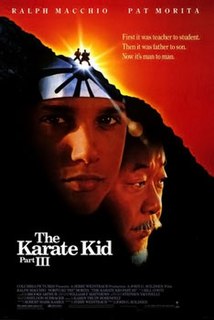
The Karate Kid Part III is a 1989 American martial arts drama film, the third entry in the Karate Kid franchise and a sequel to The Karate Kid Part II (1986). It stars Ralph Macchio, Pat Morita, Robyn Lively, and Thomas Ian Griffith in his film debut. As was the case with the first two films in the series, it was directed by John G. Avildsen and written by Robert Mark Kamen, with stunts choreographed by Pat E. Johnson and music composed by Bill Conti. In the film, the returning John Kreese, with the help of his best friend Terry Silver, attempts to gain revenge on Daniel and Mr. Miyagi which involves hiring a ruthless martial artist and harming their relationship.
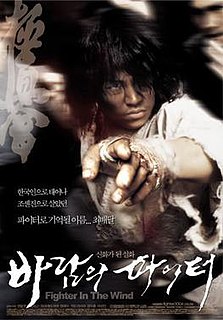
Fighter in the Wind is a 2004 South Korean film. It is based on the Japanese book Karate Baka Ichidai which is a fictionalized account of karate competitor Choi Yeung-Eui who went to Japan during World War II to become a fighter pilot but found a very different path instead. He changed his name to Masutatsu Oyama (大山倍達) and went across the country, defeating martial artists one after another. This film concentrates on the period when he is still young, and developing his famous karate style, Kyokushin. The film was the seventh highest grossing Korean film of 2004 with 2,346,446 admissions sold nationwide.
Salvatore "Sam" Greco is an Australian retired full contact karateka, heavyweight K-1 kickboxer, mixed martial artist. He was the 1994 Karate World Cup champion and holds notable kickboxing victories over Branko Cikatic, Ernesto Hoost, Mike Bernardo, Stefan Leko, and Ray Sefo, as well as MMA victories over Heath Herring and Shungo Oyama.
Jerry Smith is a former professional full-contact fighting coach, as well as co-founder of the Black Karate Federation (BKF) and founder of The Five-Level Method/Shorin-Ju Kenpo.
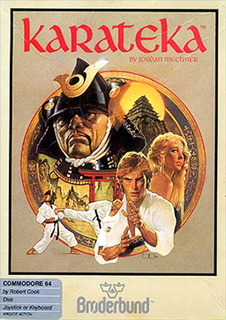
Karateka is a 1984 martial arts action game by Jordan Mechner and is his first published game, created for the Apple II while attending Yale University. The game was published in North America by Broderbund and in Europe by Ariolasoft. Along with Karate Champ and Yie-Ar Kung Fu, Karateka is one of the earliest martial arts fighting games. It was inspired by Japanese culture and by early Disney animated films and silent pictures.
Willie Williams was an American karateka, mixed martial artist and professional wrestler.
The Karate Kid is an American martial arts drama franchise created by Robert Mark Kamen. The series follows the journey of various coming-of-age teenagers who are taught in the ways of martial arts by an experienced mentor in order to stand up for themselves after being bullied, or assert their dominance towards others.
Norman Robinson is a South African master of Shotokan karate. He and Stan Schmidt were the first practitioners of Shotokan karate in South Africa and they instigated the establishment of the South African branch of the Japan Karate Association (JKA) in 1965 and popularized the art across the country. In 1970 he was one of the first westerners to be invited into the JKA's famous Instructor Class in the Tokyo Honbu dojo, the invitation having been offered by Masatoshi Nakayama himself. Latterly, he established Japan Karate Shotokai South Africa, having remained loyal to Tetsuhiko Asai after Asai established Japan Karate Shotokai. Norman Robinson is also a distinguished student of Judo, holding a 7th dan in that art, and is also known for his acting roles in several martial arts films.
Stan Schmidt was a South African master of Shotokan karate. Along with others, such as Norman Robinson, he was an early practitioner of Shotokan karate in South Africa and his establishment of the South African branch of the Japan Karate Association (JKA) in 1965 after training in Japan, along with his subsequent promotion of the art in South Africa, earned him the appellation of 'The Father of South African Karate'. In 1963, he was one of the first westerners to be invited into the JKA's famous Instructor Class in the Tokyo Honbu dojo and he was later one of four non-Japanese karateka to sit on the JKA's international Shihankai. He was also the first non-Japanese karateka to attain 7th dan from the JKA and also the first to attain 8th dan. Today, he is the highest ranking non-Japanese karate master of that organization. He is also known for his acting roles in several martial arts films of the 1970s and 1980s.

Karin Prinsloo is a South African karateka, gold medal winner of the 6th World Games (2001) in the under 60 kg Kumite category and Karate instructor formerly based in Durban, South Africa, now hailing from Perth, Australia. She is listed among the top 100 Karate competitors of all time.

Cobra Kai: The Karate Kid Saga Continues is a side-scrolling beat 'em-up video game based on the American streaming television series Cobra Kai. Developed by Flux Games and published by GameMill Entertainment in North America and Maximum Games in Europe, it was released for Nintendo Switch, PlayStation 4, and Xbox One on October 27, 2020, and for Microsoft Windows on January 5, 2021. The Nintendo Switch version was released in Europe on November 24, 2020. Ralph Macchio, William Zabka, Jacob Bertrand, and Gianni DeCenzo reprise their roles as Daniel LaRusso, Johnny Lawrence, Eli "Hawk" Moskowitz, and Demetri Alexopoulos respectively, while the rest of the other characters are voiced by different actors. A sequel developed by Flux Games and published GameMill Entertainment titled Cobra Kai 2: Dojos Rising was released on November 8, 2022 for Microsoft Windows via Steam, Nintendo Switch, PlayStation 4, PlayStation 5, Xbox One, and Xbox Series X/S.











